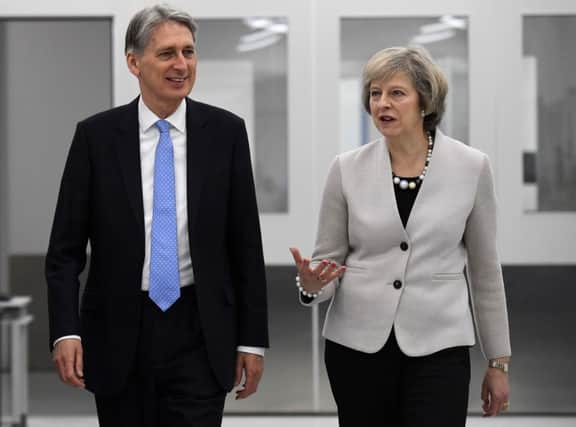Brexit: UK facing '˜dreadful decade' as living standards slip


The squeeze on incomes is expected to be the worst in at least 70 years, with wages in 2021 set to still be below what they were before the financial crisis, after taking account of inflation. Experts yesterday warned the Autumn Statement would see 11 million low and middle-income households lose an average of £390 per year, with higher inflation following the EU referendum worsening the impact of benefit cuts.
Chancellor Philip Hammond insisted that debt wasn’t out of control and refused to apologise for the government missing its financial targets, despite announcing £122 billion of new borrowing that will see the UK’s debt rise to almost £2 trillion.
Advertisement
Hide AdAdvertisement
Hide Ad“It’s not out of control, it’s larger than we would like it to be,” Mr Hammond said.
“We should have a plan which both invests in our economy... but also puts a little aside for the possibility of a slightly more rainy day next and the year after, as the OBR forecasts suggest.”
The Chancellor’s injection of £23bn for infrastructure and innovation will raise investment to 2.3 per cent of GDP, roughly the same level as under Labour before 2008.
However, the respected Institute for Fiscal Studies (IFS) think-tank said measures to boost the incomes of low-earners would “pale into insignificance” compared with benefit cuts and tax credit restrictions announced by Mr Osborne last year, and continued by Mr Hammond.
The IFS said low growth and inflation caused by the fall in the pound meant wages were projected to rise by just 5 per cent between now and 2021.
“One cannot stress enough how dreadful that is – more than a decade without real earnings growth,” IFS director Paul Johnson said.
“We have certainly not seen a period remotely like it in the last 70 years.”
Independent think-tank the Resolution Foundation said there would be a “very real impact on family finances”, with weekly earning set to grow by just 1.6 per cent over the decade to 2020, compared with 12.7 per cent in the 2000s and more than 20 per cent in every other decade since the 1920s.
Advertisement
Hide AdAdvertisement
Hide AdResolution Foundation director Torsten Bell said: “The combination of lower growth, higher inflation and the government’s decision to press ahead with big welfare cuts, means that households risk experiencing even slower income growth in this parliament than they saw in the aftermath of the financial crisis.
“But unlike the last parliament, it will be low- and middle-income households who feel the tightest squeeze this time round.”
Matt Whittaker, the Resolution Foundation’s chief economist, added that “workers are on course to experience the weakest decade of pay growth in over a century”.
A 2p-in-the-pound increase in the amount those on income support can earn before Universal Credit is withdrawn was “a small increase in generosity relative to the cuts announced last year,” Mr Johnson said.
The IFS chief condemned the “absurdity” of repeated changes to Universal Credit before many claimants have begun receiving the new benefit.
“What we have seen has not been a rational process,” he said. “This is not how to design and introduce the biggest reform to our welfare system in decades.”
Following the publication of its bi-annual economic forecasts, the Office of Budget Responsibility (OBR) was criticised by pro-Brexit politicians for its negative outlook.
Former Cabinet minister Iain Duncan Smith said the OBR’s forecasts were “another utter doom and gloom scenario” by an organisation “that simply hasn’t got anything right”.